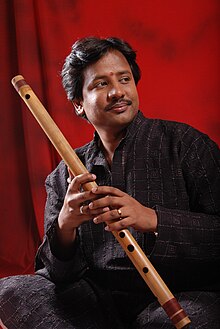Bapu Padmanabha

This article may have been created or edited in return for undisclosed payments, a violation of Wikipedia's terms of use. It may require cleanup to comply with Wikipedia's content policies, particularly neutral point of view. (August 2019) |
Bapu Padmanabha | |
|---|---|
 | |
| Background information | |
| Born | 18 November 1978 Harihar, Karnataka, India |
| Genres | Hindustani classical music, Mantra, Film scores, Indian classical, Vachana sahitya, Meditation, World Music |
| Occupation(s) | Flutist, music director, composer, singer, Record producer |
| Instrument(s) | Bansuri, flute, Singer |
| Years active | 1999-present |
| Labels | Lahari Music, TuneCore |
| Website | bapuflute |
Bapu Padmanabha, also known as Bapu Flute, is an Indian musician and composer who performs Hindustani classical music on his bansuri, a type of bamboo flute. He was born on 18 November 1978 in Harihar which is in Davanagere District of Karnataka state in India.
Musical style and impact
[edit]Adept in Hindustani Classical Music, Mantra Chantings, New Age, Film Score, Ambient Music, and World Music, Bapu is noted for composing music for the National Award Winner film Allama and Bapu's love for experimenting with Mantra sounds. Bapu used Carnatic, Hindustani, and Lounge music as the tools of expression for Allama Prabhu's Vachanas. Bapu's soft and restrained musical style has varied meditative albums to his credit.[1]
A Music C.D. entitled Music as Therapy by Bapu Padmanabha of Harihar, Karnataka State was released by External Affairs Government of India in order to acquaint foreign cultural delegates with Indian classical music.[2]
Film music
[edit]
Bapu Padmanabha won the National Film Award for Best Music Direction for the film Allama Prabhu. Bapu composed music[3] for the film Allama Prabhu produced by Yajaman Enterprises, M.D. SriHari, L. Khoday Khoday Group, and directed by T. S. Nagabharana.[1]
References
[edit]- ^ a b Govind, Ranjani (15 April 2016). "Focus is on the details in the making of Allama Prabhu". The Hindu. Retrieved 23 August 2019.
- ^ Staff. "Bapu Padmanabha: Music Director". Movie Buff.
- ^ A. Sharadhaa (31 March 2016). "Bapu Padmanabha's Tunes In Allama Prabhu". The New Indian Express. Retrieved 23 August 2019.